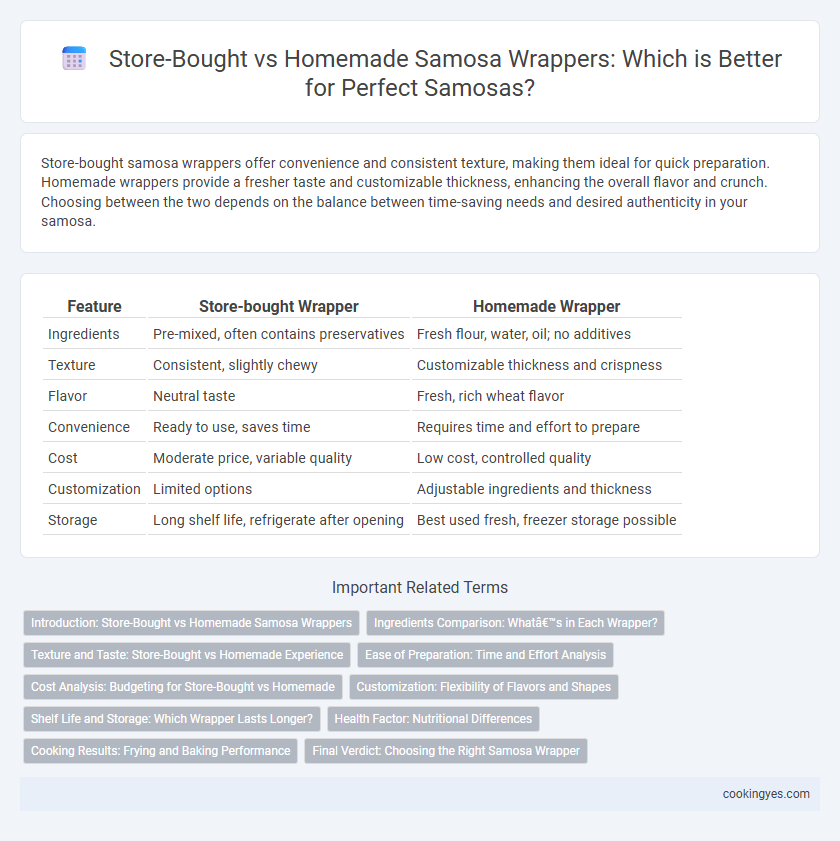Store-bought samosa wrappers offer convenience and consistent texture, making them ideal for quick preparation. Homemade wrappers provide a fresher taste and customizable thickness, enhancing the overall flavor and crunch. Choosing between the two depends on the balance between time-saving needs and desired authenticity in your samosa.
Table of Comparison
| Feature | Store-bought Wrapper | Homemade Wrapper |
|---|---|---|
| Ingredients | Pre-mixed, often contains preservatives | Fresh flour, water, oil; no additives |
| Texture | Consistent, slightly chewy | Customizable thickness and crispness |
| Flavor | Neutral taste | Fresh, rich wheat flavor |
| Convenience | Ready to use, saves time | Requires time and effort to prepare |
| Cost | Moderate price, variable quality | Low cost, controlled quality |
| Customization | Limited options | Adjustable ingredients and thickness |
| Storage | Long shelf life, refrigerate after opening | Best used fresh, freezer storage possible |
Introduction: Store-Bought vs Homemade Samosa Wrappers
Store-bought samosa wrappers offer convenience with uniform thickness and easy availability, making them ideal for quick preparation. Homemade samosa wrappers provide control over ingredients and texture, allowing for a fresher, crispier bite tailored to individual preferences. Choosing between the two depends on the balance of time, quality, and authenticity desired in samosa preparation.
Ingredients Comparison: What’s in Each Wrapper?
Store-bought samosa wrappers typically contain refined flour, salt, water, and preservatives to extend shelf life and maintain flexibility, often lacking any oils or alternative flours. Homemade samosa wrappers use simple ingredients like all-purpose flour, water, salt, and oil or ghee, allowing for control over quality and texture without additives. The inclusion of oil in homemade wrappers results in a flakier texture compared to the chewier, more uniform consistency of store-bought ones.
Texture and Taste: Store-Bought vs Homemade Experience
Store-bought samosa wrappers offer consistent thickness and ease of use but often lack the flaky, crisp texture achieved with homemade dough, which can be finely tuned for desired crunchiness through ingredients like ghee or oil. Homemade wrappers deliver superior taste with a fresh, buttery flavor and customizable crispness, enhancing the overall samosa experience. Texture-wise, store-bought wrappers may become soggy faster, while homemade ones maintain structural integrity and provide a satisfying bite.
Ease of Preparation: Time and Effort Analysis
Store-bought samosa wrappers offer a significant advantage in ease of preparation, saving considerable time and reducing effort compared to homemade wrappers, which require kneading, rolling, and resting the dough. Homemade wrappers provide control over thickness and freshness but demand skill and patience, often taking 30-40 minutes or more before wrapping. Using store-bought wrappers streamlines the process, allowing quicker assembly without compromising taste for most home cooks.
Cost Analysis: Budgeting for Store-Bought vs Homemade
Store-bought samosa wrappers typically cost more per unit due to packaging and brand pricing but save time and labor, making them ideal for small batches or occasional use. Homemade wrappers involve purchasing basic ingredients like flour, oil, and water, which are inexpensive and allow for larger quantities, reducing cost per samosa significantly for frequent cooking. Budget-conscious cooks aiming for bulk preparation benefit from homemade wrappers, while those valuing convenience may find store-bought options more cost-effective despite higher per-unit prices.
Customization: Flexibility of Flavors and Shapes
Store-bought samosa wrappers offer convenience but limit customization options, typically providing a uniform texture and shape. Homemade samosa wrappers allow full control over ingredients, enabling variations in flavor by adding spices or herbs to the dough and adjusting thickness for different crispness levels. Customizing shapes from classic triangles to creative forms enhances presentation and caters to specific preferences, making homemade wrappers ideal for personalized samosa creations.
Shelf Life and Storage: Which Wrapper Lasts Longer?
Store-bought samosa wrappers typically have preservatives that extend shelf life up to several weeks when refrigerated and longer if frozen, while homemade wrappers lack additives, limiting their freshness to a few days in the fridge. Proper storage in airtight containers significantly impacts both types; however, frozen store-bought wrappers maintain texture and pliability better upon thawing compared to homemade ones. For longer shelf life and convenience, frozen store-bought wrappers are generally more reliable than homemade versions, which are best used fresh.
Health Factor: Nutritional Differences
Store-bought samosa wrappers often contain preservatives, artificial flavors, and high sodium levels, which can negatively impact overall health. Homemade samosa wrappers, made from whole wheat or refined flour without additives, provide better control over ingredients, allowing for healthier fat and salt content adjustment. Nutritionally, homemade wrappers typically offer higher fiber content and fewer harmful chemicals, supporting a more balanced and wholesome diet.
Cooking Results: Frying and Baking Performance
Store-bought samosa wrappers offer consistent thickness and durability, leading to uniform frying with a crisp, golden exterior and reduced oil absorption. Homemade wrappers provide control over texture and thickness, resulting in a slightly chewier bite but may vary in durability and frying performance, sometimes absorbing more oil or tearing during cooking. When baked, store-bought wrappers tend to hold shape better and achieve even browning, while homemade wrappers offer a more rustic finish but may require careful handling to prevent sogginess or uneven cooking.
Final Verdict: Choosing the Right Samosa Wrapper
Store-bought samosa wrappers offer convenience and consistent thickness but may contain preservatives and lack the authentic texture achieved by homemade dough. Homemade samosa wrappers allow full control over ingredients, resulting in a fresher, crispier finish with customizable thickness tailored to personal preference. For the best balance of taste and quality, homemade wrappers are ideal, while store-bought options suit those seeking quick preparation without compromising too much on flavor.
Store-bought wrapper vs Homemade wrapper for samosa Infographic

 cookingyes.com
cookingyes.com